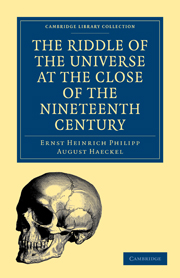Book contents
- Frontmatter
- Contents
- PREFACE
- AUTHOR'S PREFACE
- CHAPTER I THE NATURE OF THE PROBLEM
- CHAPTER II OUR BODILY FRAME
- CHAPTER III OUR LIFE
- CHAPTER IV OUR EMBRYONIC DEVELOPMENT
- CHAPTER V THE HISTORY OF OUR SPECIES
- CHAPTER VI THE NATURE OF THE SOUL
- CHAPTER VII PSYCHIC GRADATIONS
- CHAPTER VIII THE EMBRYOLOGY OF THE SOUL
- CHAPTER IX THE PHYLOGENY OF THE SOUL
- CHAPTER X CONSCIOUSNESS
- CHAPTER XI THE IMMORTALITY OF THE SOUL
- CHAPTER XII THE LAW OF SUBSTANCE
- CHAPTER XIII THE EVOLUTION OF THE WORLD
- CHAPTER XIV THE UNITY OF NATURE
- CHAPTER XV GOD AND THE WORLD
- CHAPTER XVI KNOWLEDGE AND BELIEF
- CHAPTER XVII SCIENCE AND CHRISTIANITY
- CHAPTER XVIII OUR MONISTIC RELIGION
- CHAPTER XIX OUR MONISTIC ETHICS
- CHAPTER XX SOLUTION OF THE WORLD-PROBLEMS
- INDEX
AUTHOR'S PREFACE
Published online by Cambridge University Press: 05 August 2011
- Frontmatter
- Contents
- PREFACE
- AUTHOR'S PREFACE
- CHAPTER I THE NATURE OF THE PROBLEM
- CHAPTER II OUR BODILY FRAME
- CHAPTER III OUR LIFE
- CHAPTER IV OUR EMBRYONIC DEVELOPMENT
- CHAPTER V THE HISTORY OF OUR SPECIES
- CHAPTER VI THE NATURE OF THE SOUL
- CHAPTER VII PSYCHIC GRADATIONS
- CHAPTER VIII THE EMBRYOLOGY OF THE SOUL
- CHAPTER IX THE PHYLOGENY OF THE SOUL
- CHAPTER X CONSCIOUSNESS
- CHAPTER XI THE IMMORTALITY OF THE SOUL
- CHAPTER XII THE LAW OF SUBSTANCE
- CHAPTER XIII THE EVOLUTION OF THE WORLD
- CHAPTER XIV THE UNITY OF NATURE
- CHAPTER XV GOD AND THE WORLD
- CHAPTER XVI KNOWLEDGE AND BELIEF
- CHAPTER XVII SCIENCE AND CHRISTIANITY
- CHAPTER XVIII OUR MONISTIC RELIGION
- CHAPTER XIX OUR MONISTIC ETHICS
- CHAPTER XX SOLUTION OF THE WORLD-PROBLEMS
- INDEX
Summary
The present study of the monistic philosophy is intended for thoughtful readers of every condition who are united in an honest search for the truth. An intensification of this effort of man to attain a knowledge of the truth is one of the most salient features of the nineteenth century. That is easily explained, in the first place, by the immense progress of science, especially in its most important branch, the history of humanity; it is due, in the second place, to the open contradiction that has developed during the century between science and the traditional “Revelation”; and, finally, it arises from the inevitable extension and deepening of the rational demand for an elucidation of the innumerable facts that have been recently brought to light, and for a fuller knowledge of their causes.
Unfortunately, this vast progress of empirical knowledge in our “Century of Science,” has not been accompanied by a corresponding advancement of its theoretical interpretation—that higher knowledge of the causal nexus of individual phenomena which we call philosophy. We find, on the contrary, that the abstract and almost wholly metaphysical science which has been taught in our universities for the last hundred years under the name of “philosophy” is far from assimilating our hard-earned treasures of experimental research. On the other hand, we have to admit, with equal regret, that most of the representatives of what is called “exact science” are content with the special care of their own narrow branches of observation and experiment, and deem superfluous the deeper study of the universal connection of the phenomena they observe—that is, philosophy.
- Type
- Chapter
- Information
- Publisher: Cambridge University PressPrint publication year: 2009First published in: 1900



